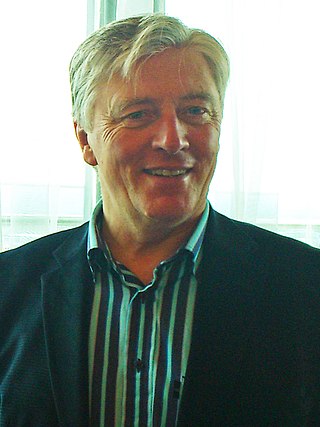
Patrick Kenny is an Irish broadcaster, who currently hosts the daily radio show The Pat Kenny Show on Newstalk and the current affairs show Pat Kenny Tonight on Virgin Media One.
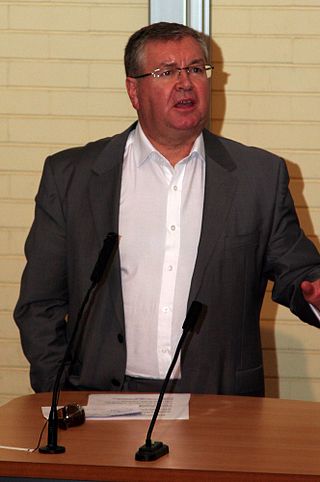
Joseph Duffy is an Irish radio and TV presenter employed by RTÉ. One of the public service broadcaster's highest-earning stars, he is the current presenter of Liveline, an interview and phone-in chat show broadcast on RTÉ Radio 1 on Mondays to Fridays between 13:45 and 15:00.

Question Time is a topical debate programme, typically broadcast on BBC One at 10:45 pm on Thursdays. It is usually repeated on BBC Two and on BBC Parliament later in the week. If there is a Leaders special, it would be broadcast simultaneously on BBC News. Question Time is also available on BBC iPlayer. Fiona Bruce currently chairs the show having succeeded David Dimbleby as presenter in January 2019.

The Den was a long-running children's television strand of Ireland's public broadcaster Raidió Teilifís Éireann. First broadcast on 29 September 1986 on RTÉ1, it moved to Network 2 two years later. Initially a continuity strand for weekday afternoon programmes, The Den later expanded during the late 1990s and the 2000s until it became synonymous with RTÉ's children's output. At various times during its run, it was known as Dempsey's Den, Den TV and Den2.

Prime Time is an Irish current affairs television programme airing on RTÉ One on Tuesday and Thursday nights.
John Bowman is an Irish historian and a long-standing broadcaster and presenter of current affairs and political programmes with RTÉ. He chaired the audience-participation political programme Questions and Answers on RTÉ One for 21 years. He is the father of comedian and journalist Abie Philbin Bowman and the broadcaster and journalist Jonathan Philbin Bowman.
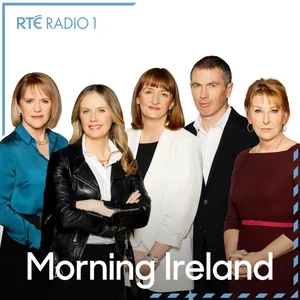
Morning Ireland is an Irish breakfast news programme broadcast by RTÉ Radio 1 and is noted as the country's most listened to radio programme. It is broadcast each weekday morning between 07.00 and 09.00 and alternate items are normally presented by two presenters from the current rota, which included Audrey Carville, Rachael English, Gavin Jennings and Fran McNulty as of Cathal Mac Coille's retirement in 2017. Occasional weekend editions are also aired on the occasion of major breaking news stories such as general elections, referendums or important news events.

The Panel is a talk show produced by Happy Endings Productions for RTÉ, based on the Australian programme The Panel, produced by Working Dog Productions for Network Ten. The theme song was "Waterfall" by The Stone Roses.
Liveline is an Irish radio interview and phone-in chat show broadcast on RTÉ Radio 1 each weekday afternoon between 13.45 and 15.00. The programme, which has been presented since 1999 by Joe Duffy, and is known for its slogan, "Talk to Joe", tends to seek the public's opinion on various questions and debates, and invites conversation on current events and controversies. It also gives a platform to those who have suffered grievances or distressing events, and wish to raise awareness of them on the national airwaves. According to The New York Times, it is Ireland's "most popular radio call-in program". According to the Irish Independent, "[Joe Duffy's] greeting at 1.45pm every weekday—"Hello, good afternoon and you're very welcome to Liveline"—is the signal for 400,000 listeners to sit back and await some lively debate or the exposure of a scam or a social scandal".
Eoghan Harris is an Irish journalist, columnist, director, and former politician. He has held posts in various and diverse political parties. He was a leading theoretician in the Marxist-Leninist Workers' Party. Harris was a fierce critic of Provisional Sinn Féin, from which they had split, and became an opponent of Irish republicanism. For much of the Troubles, from the 1970s until the 1990s, Harris worked in Raidió Teilifís Éireann (RTÉ) and was influential in shaping the current affairs output of Ireland's national broadcaster. Later he began writing for the Sunday Independent newspaper.

The 2011 Irish general election took place on Friday 25 February to elect 166 Teachtaí Dála across 43 constituencies to Dáil Éireann, the lower house of Ireland's parliament, the Oireachtas. The Dáil was dissolved and the general election called by President Mary McAleese on 1 February, at the request of Taoiseach Brian Cowen. The 31st Dáil met on 9 March 2011 to nominate a Taoiseach and approve the new ministers of the 29th government of Ireland.
The State of Us is a four-part mockumentary which was broadcast on Irish television channel RTÉ One on Sunday nights at 21:40. It stars Risteárd Cooper, well known in Ireland for his part in the Après Match sketches. It was created and written by Cooper and Gerard Stembridge and focuses on the clash between politicians and the media. It is filmed mostly in and around RTÉ Television Centre in Montrose. The first episode was broadcast on Sunday 22 April 2007.
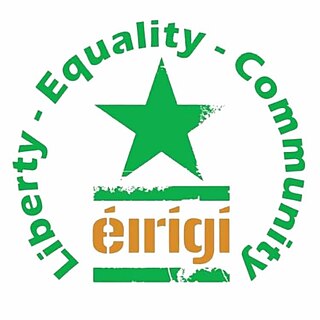
Éirígí, officially Éirígí For A New Republic, is a socialist republican political party in Ireland. The party name, Éirígí, means "Arise" or "Rise Up" in Irish, and is a reference to the slogan "The great only appear great because we are on our knees. Let us rise!" used by Irish socialists James Connolly and Jim Larkin. Éirígí was formed in 2006 by a group of community and political activists who broke away from Sinn Féin, believing that party was not committed enough to socialism.

The Jacob's Awards were instituted in December 1962 as the first Irish television awards. Later, they were expanded to include radio. The awards were named after their sponsor, W. & R. Jacob & Co. Ltd., a biscuit manufacturer, and recipients were selected by Ireland's national newspaper television and radio critics. Jacob's Award winners were chosen annually until 1993, when the final awards presentation took place.

Brian Joseph Lenihan was an Irish Fianna Fáil politician who served as Minister for Finance from 2008 to 2011, Deputy leader of Fianna Fáil from March 2011 to June 2011, Minister for Justice, Equality and Law Reform from 2007 to 2008 and Minister of State for Children from 2002 to 2007. He served as a Teachta Dála (TD) for the Dublin West constituency from 1996 until his death in 2011.
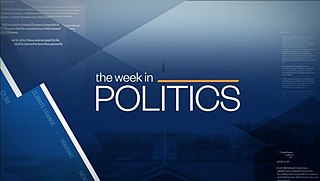
The Week in Politics is an Irish news and current affairs programme broadcast on RTÉ One and the RTÉ News channel. It is presented by Áine Lawlor, occasionally by Sharon Ní Bheoláin or Paul Cunningham. In its original format in 1996 it was hosted by Caroline Erskine and Seán Duignan.

Raidió Teilifís Éireann is an Irish public service broadcaster. It both produces and broadcasts programmes on television, radio and online. The radio service began on 1 January 1926, while regular television broadcasts began on 31 December 1961, making it one of the oldest continuously operating public service broadcasters in the world. It is headquartered in Donnybrook in Dublin, with offices across different parts of Ireland.

The Frontline is a topical debate television programme in Ireland, which aired for 60 minutes every Monday night on RTÉ One at 22:30. It debuted on Monday, 21 September 2009. The Frontline replaced a similar political analysis show Questions and Answers. The programme features around an invited audience and featured guests.
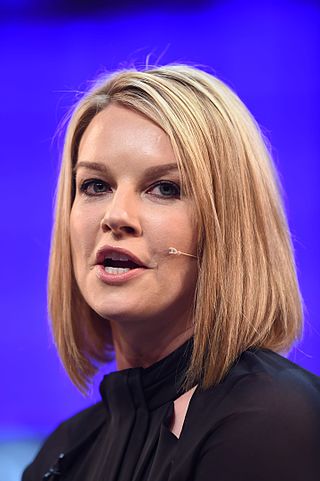
Claire Byrne is an Irish radio and television presenter.
The following is a list of events relating to television in Ireland from 2009.















